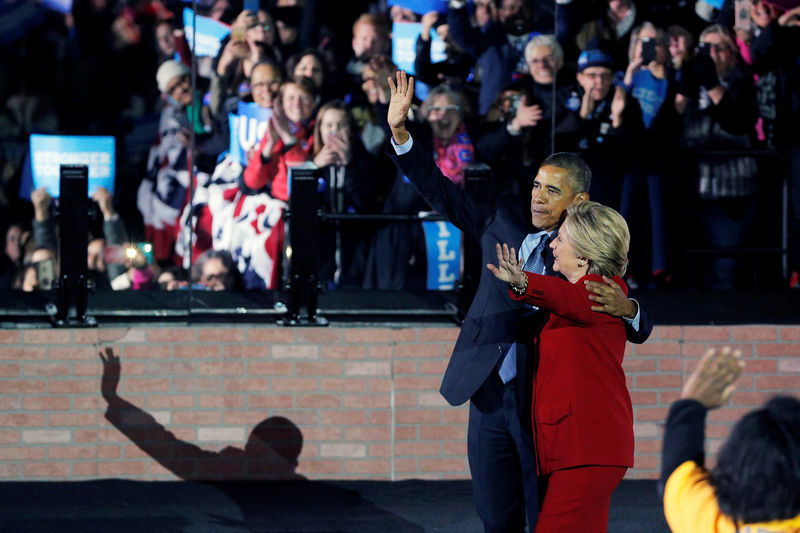By Maurice Tamman
NEW YORK (Reuters) - With hours to go before Americans vote, Democrat Hillary Clinton has about a 90 percent chance of defeating Republican Donald Trump in the race for the White House, according to the final Reuters/Ipsos States of the Nation project.
Her chances are roughly similar to last week's odds, and any upset by Trump on Tuesday depends on an unlikely combination of turnouts of white, black and Hispanic voters in six or seven states, according to the survey released on Monday.
The former secretary of state was leading Trump by about 45 percent to 42 percent in the popular vote, and was on track to win 303 votes in the Electoral College to Trump’s 235, clearing the 270 needed for victory, the survey found.
Trump's chances rest with his performance in Florida, Michigan, North Carolina and Ohio, which were too close to call on Sunday, when polling ended, and Pennsylvania, where Clinton enjoyed a slim lead of three percentage points. For Trump to win, he will have to take most of those states.
Any combination of two losses in the three states of Florida, Michigan and Pennsylvania would almost assuredly result in a Clinton victory. At the same time, Trump must hold onto the traditionally Republican state of Arizona, where the race has drawn close, and hope that independent candidate Evan McMullin does not claim another Republican bastion, Utah.
To win, Trump needs higher turnout among Republican white voters than that which materialized in 2012, a drop-off in ballots by African-American voters and a smaller-than-predicted increase in Hispanic voters, the project showed.
CLUES TO THE OUTCOME
North Carolina, one of the first states to report results on Tuesday night, might provide clues to the outcome. If Clinton wins the state, it probably means African Americans are turning out to vote at a similar rate to 2012, when President Barack Obama beat Republican Mitt Romney by four points nationally. Romney won North Carolina by two points.
The States of the Nation poll found that early votes have been cast evenly between Trump and Clinton in North Carolina. Trump enjoyed a slim one-point advantage among all likely voters, 47 percent to Clinton’s 46. He had a 30 percentage point lead among white voters, while Clinton led by about 85 points among black voters.
Florida, with its 29 electoral college votes, is crucial to Trump. If Clinton wins Florida, she just needs to win one of the three big swing states of Ohio, Michigan and Pennsylvania while Trump would have to win all three. If he wins Florida, Trump still must win both Ohio and Michigan or hope for an upset in Pennsylvania.
According to the project, Clinton enjoys the tiniest of leads in Florida, 48 percent to 47. Clinton leads Trump by 75 points among black voters and has about a 20 point lead among Hispanics. But Trump enjoys a 30 point lead among likely white voters. Clinton’s success in Florida depends on heavy turnout among black voters. Without it, the race becomes razor-thin, even with a large increase in Hispanic ballots.
Michigan and Ohio were too close to call on Sunday, according to the project. Clinton’s support is more solid in Pennsylvania. Still, a surge of white Republican voters combined with a drop in turnout among black Democrats could be enough to tilt Ohio and Michigan to Trump and put Pennsylvania in play.
If Trump remains in contention on Tuesday night after the eastern swing states have been decided, eyes will turn to Arizona. Trump led Clinton by five points on Sunday, but Arizona had moved steadily toward Clinton in recent weeks, according to the project. It is also a state where higher Hispanic turnout could tip the result in Clinton’s favor.
If Trump is in a position to win after Arizona, he could still be tripped up by Utah, where McMullin has remained a contender to the end.
Opinion polls have Trump up by five points or more in Utah. A McMullin upset could set up a low-probability scenario where neither Clinton or Trump reaches the 270 Electoral College votes needed to win. The election would then be decided by the Republican-controlled U.S. House of Representatives, where lawmakers would have a three-way choice among Trump, Clinton and McMullin, a Utah native and former CIA operative.

The States of the Nation project is a survey of about 15,000 people every week in all 50 states plus Washington, D.C. State by state results are available by visiting http://www.reuters.com/statesofthenation/